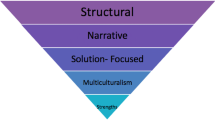Abstract
The emphasis in family therapy literature on brief therapy has given a false sense of what family therapy can accomplish. While it has helped to develop different theories of change and refine techniques to deal with resistance, it has caused many clinicians to mistake technique for treatment. A long term developmental approach is advocated in which the family therapist is the general practitioner rather than the specialist. This paper is the result of a 30-year caseload in which there was a group of multi-therapy families.
Similar content being viewed by others
References
Andolfi, M., Angelo, C., Menghi, P., & Nicolo-Gorigliano, A. (1983).Behind the family mask. New York: Brunner/Mazel.
Bergman, J. (1985).Fishing for barracuda. New York: W. W. Norton.
Bowen, M. (1978).Family therapy in clinical practice. New York: Jason Aronson.
Caille, P., Abrahamsen, P., Girolami, C., & Sorlbye, B. (1977). A systems theory approach to a case of anrexia nervosa.Family Process, 16, 455–465.
de Shazar, S. (1982).Patterns of brief family therapy. New York: Guilford Press.
de Shazar, S. (1985).Keys to solution in brief therapy. New York: W. W. Norton.
Fisch, R., Weakland, J., & Segal, L. (1983).The tactics of change: Doing therapy briefly. San Francisco: Jossey-Bass.
Freud, S. (1958). The dynamics of transference. In J. Strachey (Ed. and Trans.),The standard edition of the complete psychological works of Sigmund Freud, Vol XII (pp. 97–108). London: Hogarth Press.
Framo, J. L. (1976). Family of origin as a therapeutic resource for adults in marital and family therapy: You can and should go home again.Family Process, 15, 193–210.
Haley, J. (1976).Problem-solving therapy. San Francisco: Jossey-Bass.
Haley, J. (1984).Ordeal therapy: Unusual ways to change behavior. San Francisco: Jossey-Bass.
Mallouk, T. (1982). The interpersonal context of object relations: Implications for family therapy.Journal of Marital and Family Therapy, 8, 429–441.
Papp, P. (Ed.). (1977).Family therapy: Full length case studies. New York: Gardner Press.
Scharff, D., & Scharff, J. (1987).Object relations family therapy. New York: Jason Aronson.
Selvini Palazzoli, M., Boscolo, L., Cecchin, G., & Prata, G. (1978).Paradox and counterparadox. New York: Jason Aronson.
Selvini Palazzoli, M., Cirillo, S., Selvini, M., & Sorrentino, M. (1989).Family games: General models of psychotic processes in the family. New York: W. W. Norton.
Watzlawick, P., Weakland, J., & Fisch, R. (1974).Change: Principles of problem formation and problem resolution. New York: W. W. Norton.
Author information
Authors and Affiliations
Rights and permissions
About this article
Cite this article
Braverman, S. Long-term family therapy: A developmental approach. Contemp Fam Ther 12, 129–138 (1990). https://doi.org/10.1007/BF00892491
Issue Date:
DOI: https://doi.org/10.1007/BF00892491




